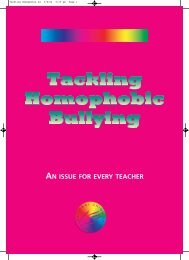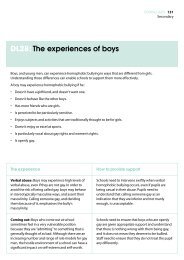Non-Normative Gender and Sexual Identities in Schools: - Schools Out
Non-Normative Gender and Sexual Identities in Schools: - Schools Out
Non-Normative Gender and Sexual Identities in Schools: - Schools Out
You also want an ePaper? Increase the reach of your titles
YUMPU automatically turns print PDFs into web optimized ePapers that Google loves.
with prevail<strong>in</strong>g constructions of mascul<strong>in</strong>e <strong>and</strong> fem<strong>in</strong><strong>in</strong>e identities. Various studies have, for<br />
example, commented on the powerful role of homophobia with<strong>in</strong> male peer culture <strong>and</strong> <strong>in</strong><br />
construct<strong>in</strong>g <strong>and</strong> re<strong>in</strong>forc<strong>in</strong>g stereotypical ideas of what it means to be a ‘real’ boy or man.<br />
Based on the assumption of heterosexuality, boys who def<strong>in</strong>e themselves as mascul<strong>in</strong>e<br />
subjects <strong>in</strong> conformity with this dom<strong>in</strong>ant mascul<strong>in</strong>ity tend to position themselves <strong>in</strong><br />
opposition to girls/women, gay or bisexual <strong>and</strong>/or non-macho boys/men.<br />
For girls, a socially acceptable fem<strong>in</strong><strong>in</strong>ity is also premised on the norm of heterosexuality,<br />
<strong>and</strong> <strong>in</strong>cludes a requirement to have a ‘fem<strong>in</strong><strong>in</strong>e’ appearance, thus mark<strong>in</strong>g girls out as<br />
different to the boys. Deviations from these ‘fem<strong>in</strong><strong>in</strong>e’ conventions, <strong>in</strong>clud<strong>in</strong>g be<strong>in</strong>g too<br />
sexual, too popular, too different or too confident, are thereby stigmatised as be<strong>in</strong>g evidence<br />
of a girl’s ‘distorted’ sexuality <strong>and</strong> expressed, for example, <strong>in</strong> pejorative comments about<br />
the girl be<strong>in</strong>g ‘butch’, a ‘slag’, a ‘bitch’, or a ‘lezzie’.<br />
Boys’ <strong>and</strong> girls’ sex/gender identities are developed under constant pressure <strong>and</strong><br />
surveillance between <strong>and</strong> with<strong>in</strong> male <strong>and</strong> female peer groups. In the classroom, boys<br />
frequently silence girls through sexist abuse <strong>and</strong> sexual harassment. At the same time,<br />
homophobia serves as a means for boys to distance themselves from fem<strong>in</strong><strong>in</strong>ity <strong>and</strong><br />
forcefully reject boys who do not conform to the dom<strong>in</strong>ant st<strong>and</strong>ard of mascul<strong>in</strong>ity. The<br />
emphasis on heterosexuality thereby ensures that the story of ‘romance’, which promotes<br />
male dom<strong>in</strong>ance <strong>and</strong> female subord<strong>in</strong>ation, is not challenged or dislocated by girls who,<br />
with<strong>in</strong> the context of their own heterosexuality, might display more ‘laddish’ behaviours.<br />
Although there are alternative forms of mascul<strong>in</strong>ity <strong>and</strong> fem<strong>in</strong><strong>in</strong>ity <strong>in</strong> our culture that, <strong>in</strong> some<br />
manifestations, challenge the cultural stereotypes, they are usually posited as ‘deviant’ <strong>and</strong><br />
therefore rema<strong>in</strong> subord<strong>in</strong>ate to the dom<strong>in</strong>ant cultural expectations of mascul<strong>in</strong>ity <strong>and</strong><br />
fem<strong>in</strong><strong>in</strong>ity. ATL recognises that teachers <strong>and</strong> lecturers have an important role <strong>in</strong> address<strong>in</strong>g<br />
<strong>and</strong> challeng<strong>in</strong>g such prejudices <strong>and</strong> stereotypes, <strong>in</strong>clud<strong>in</strong>g through the school/college’s<br />
ethos <strong>and</strong> mission statement, the curriculum, pastoral support systems, work<strong>in</strong>g with<br />
parents, governors <strong>and</strong> the community, <strong>and</strong> through specific <strong>in</strong>itiatives such as, the<br />
celebration of LGBT History Month or International Women’s Day.<br />
Every child matters <strong>and</strong> youth matters<br />
Narrow <strong>and</strong> stereotypical views of male <strong>and</strong> female identity restrict all boys <strong>and</strong> girls. They<br />
restrict not only the victims of homophobic <strong>and</strong>/or sexist bully<strong>in</strong>g <strong>and</strong> abuse, who are<br />
disproportionately more likely to truant, drop out of school without any qualifications <strong>and</strong> are<br />
at an <strong>in</strong>creased risk to self-harm <strong>and</strong>/or commit suicide, but they also restrict those<br />
<strong>in</strong>dividuals who fear social isolation <strong>and</strong> bully<strong>in</strong>g <strong>and</strong> thus feel under pressure to prove their<br />
‘mascul<strong>in</strong>ity’ or ‘fem<strong>in</strong><strong>in</strong>ity’ by engag<strong>in</strong>g <strong>in</strong> abusive or risk-tak<strong>in</strong>g behaviour.<br />
The Education <strong>and</strong> Inspections Act 2006 requires schools <strong>and</strong> colleges to implement<br />
measures that encourage respect for others, promote self-discipl<strong>in</strong>e amongst pupils, <strong>and</strong><br />
prevent all forms of bully<strong>in</strong>g, <strong>in</strong>clud<strong>in</strong>g homophobic <strong>and</strong> sexist bully<strong>in</strong>g. <strong>Schools</strong> <strong>and</strong><br />
colleges also have a responsibility under the Government’s Every Child Matters agenda to<br />
ensure that ‘every child <strong>and</strong> young person is able to fulfil their potential’. This means that<br />
schools <strong>and</strong> colleges must systematically <strong>and</strong> consistently deal with specific homophobic<br />
<strong>and</strong> sexist <strong>in</strong>cidents <strong>and</strong> should simultaneously beg<strong>in</strong> to tackle the underly<strong>in</strong>g culture<br />
lead<strong>in</strong>g to homophobic <strong>and</strong> sexist behaviour.<br />
ATL believes that the need for a wider process of cultural change requires a more<br />
<strong>in</strong>-depth underst<strong>and</strong><strong>in</strong>g of the <strong>in</strong>terrelatedness of homophobia <strong>and</strong> sexism.







